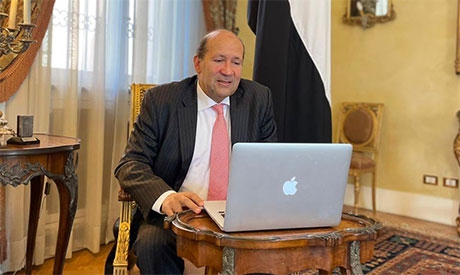
Egypt’s Ambassador to Italy Hesham Badr during the virtual seminar on GERD. photo courtesy of Egypt's foreign ministry
The Egyptian Embassy in Rome has organised a virtual seminar to explain Cairo's vision regarding the Grand Ethiopian Renaissance Dam (GERD), a statement by the foreign ministry said on Wednesday.
The online seminar has been organised in cooperation with the African Studies Centre in Turin with the participation of the Egyptian negotiating delegation in the GERD talks.
The symposium comes as a continuation of the attempts by the Egyptian foreign ministry to clarify Cairo's efforts to reach a fair and balanced agreement on the near-complete $4.8 billion dam, the statement said.
Egypt and Sudan have been in talks with Ethiopia for years now to reach a legally binding agreement on the filling and operation of the massive hydropower dam Addis Ababa is building on the Blue Nile.
Over the past year, the African Union (AU), under the presidency of South Africa, tried in vain to help the three countries reach an agreement over the long-running dispute, with the last round being stalled in January due to Khartoum's withdrawal from the meetings in objection to the methodology upon which the talks had been held.
The foreign ministry's statement revealed that the symposium has also dealt with clarifying the impacts of the GERD on the two downstream countries, Egypt and Sudan.
Egypt's Foreign Minister Sameh Shoukry has repeatedly affirmed Cairo's commitment to negotiations on the 6,000-megawatt dam for almost a decade in an aim to reach a fair and just agreement that achieves Addis Ababa's development objectives while minimising the effects of the dam on Egypt and Sudan.
Egypt’s 100 million-plus population relies on the River Nile for more than 95 percent of its renewable water resources. It fears the dam will significantly diminish its crucial water supply, which is already below scarcity level.
According to an independent study on the GERD by Deltares, which was recently published by the Egyptian Embassy in the US, a decrease of only 1 billion cubic metres of water could eliminate more than 1 million jobs and $1.8 billion in economic production annually in all economic sectors in Egypt.
Urbanisation would skyrocket due to rural depopulation, which would lead to an increase in unemployment, crime rates and transnational migration, causing serious ramifications in the Middle East and Europe.
“A loss of 1 billion cubic meters of Nile water would cost Egypt 130,000 hectares of lost cultivated land, $430 million of lost agricultural production, and a $150 million increase in food imports,” the embassy said, quoting the Deltares study.
On the other hand, in its three-page letter to the UNSC last June, Sudan said the GERD "will completely change the flow regime of the Blue Nile" by flattening its hydrograph, and with its gigantic size it "poses substantial threats to Sudan if not properly designed, constructed, filled and operated."
Sudan fears the GERD would put the operation of its Roseires dam and the lives of Sudanese citizens – 20 million Sudanese rely on the Blue Nile – at "a very high risk" if an agreement regulating its operation and filling is not reached.
Even though the AU has called for a binding agreement on the GERD filling and operation, Ethiopia announced that it is not seeking a binding agreement, but rather guidelines that can be modified any time at Ethiopia’s discretion.
Short link: